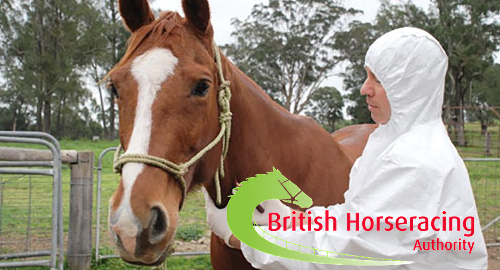 British racing will resume action on a ‘risk-managed’ basis on Wednesday (13) following last week’s outbreak of equine influenza.
British racing will resume action on a ‘risk-managed’ basis on Wednesday (13) following last week’s outbreak of equine influenza.
Late Monday, the British Horseracing Authority (BHA) announced that “a risk-managed return to racing” will commence on Wednesday. Racing’s resumption will come a full week after the BHA ordered a shutdown of all British racing following the discovery that several equine flu-infected horses had participated in races at the Ayr and Ludlow courses.
Wednesday’s announcement said the decision to resume racing was made with the unanimous support of the industry veterinary committee following more testing by the Animal Health Trust. However, the BHA said racing would only resume with “strict biosecurity controls in place.”
These controls include barring any horse from racing that hasn’t been vaccinated in the previous six months. Trainers will also have to provide a health declaration upon arrival at a racecourse.
BHA director of equine health and welfare David Sykes said the veterinary committee believe “an unprecedented amount” of equine flu has been identified in Europe and the fact that “this is not a typical endemic period” made the new biosecurity precautions essential.
BHA chief regulatory officer Brant Dunshea said the group was balancing the need to ensure no more horses were exposed to “this virulent strain of flu” — which reportedly infected some animals despite their vaccinations — while also trying to avoid “a long-term disruption to racing with the risk of many of our major events being unduly impacted.”
Dunshea said analysis of “thousands of samples, and no further positive tests on Monday,” led the BHA to conclude that the outbreak was confined to two sites, around which “robust containment measures” have been established.
Dunshea acknowledged that “there is some risk associated with returning to racing” but the level of this risk was “viewed as acceptable” given the evidence and the aforementioned biosecurity measures.
Not every stable will be given the all-clear to resume racing. The BHA is finalizing the risk categories in which to slot individual trainers and plans to inform trainers of their eligibility on Tuesday morning.
It’s unclear how much of a hit the week-long pause will have on UK betting operators’ Q1 results. Last week, the Times estimated that the betting industry as a whole was looking at a £2m loss for every day the racing ban persisted while the government would be out roughly £300k per day in lost tax revenue.
Earlier on Monday, the Irish Horseracing Regulatory Board jumped the gun a bit by announcing that British horses could compete in Irish races provided they (a) are not from one of the infected yards, and (b) can prove they were vaccinated within eight weeks of the race.